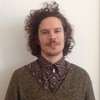Advertisement
Advertisement
Kazik Radwanski: I think what came first was a tone that I wanted to capture. I was in a weird headspace. I was about to make my second feature, and it was temporarily put on hiatus. There was a mood or feeling I was after, and I didn't want anything to disturb it. This lead to the film having such a narrow focus. I like giving myself rules or restraints. It's strangely liberating. It's like you give yourself an arena to experiment within. All of the dialogue, story, or things like that came later through the making of the film.
Advertisement
It's a feeling I've always liked. I think it's in my other work. Quite often the camera will hold on the protagonist, and we'll only get a partial sense of other characters or surroundings. There's also a mysterious feeling of showing something but then implying that more is going on offscreen. I like the sensation of only grasping the content of a scene, but feeling an emotional weight. I think specifically with this film, I wanted to approach things sideways through cutaways. I couldn't look at the themes or content directly at first. I had to find my way in through close-ups of him working. Then more content and story started to bleed out. It's sort of like working with your head down.Your films typically go against the grain of traditional storytelling. What is it about difficult characters and different styles of storytelling that gets you off?
I always like to inject chaos into my films. I want my characters to be difficult or unpredictable because I think that's truer to life and more worthwhile. I don't want us to have the upper hand over the characters. I don't want people to be able to sit back and judge them. Or, for it to be too sympathetic. I want us to be unbalanced and constantly readjusting.Are you ever going to make a straight comedy? Or is that boring to you?
Laughter is one of the most complex reactions. I love it when people laugh at certain moments in my films. I'm not sure if that will ever translate into me making a straight comedy, but I like comedies. Sometimes I feel like moments in my films aren't too far off from something like Curb Your Enthusiasm.You've had three short films screen at the Toronto International Film Festival, your last feature played at TIFF, and now your newest feature is playing at TIFF on September 13. Are you as obsessed with Canada as they are with you?
I don't know if I'm obsessed with Canada. I don't set out to make Canadian films. I think it would be a mistake to do that because it's so hard to define what Canada is. I'm first-generation Canadian, and my parents are from England. I do instinctively make films about what I know. I want to make films in houses I recognize or about jobs I know. For instance, construction is my family's business. I definitely hope to keep making films here in Canada. More specifically, in the east end of Toronto, where I grew up.What are you working on next?
I'm writing my third feature at the moment. Before that's done, I'll likely have made a short or two. I hope to keep making shorts regularly.Jeffrey Bowers is a tall mustached guy from Ohio who's seen too many weird movies. He currently lives in Brooklyn, working as a film curator. He's the senior curator for Vimeo's On Demand platform. He has also programmed at Tribeca Film Festival, Rooftop Films, and the Hamptons International Film Festival.
